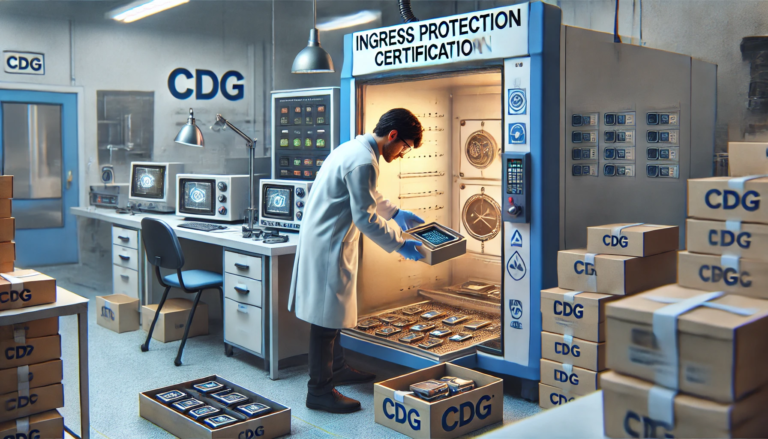In today’s tech-driven world, ensuring that electronic devices and components are protected from environmental hazards is crucial. Ingress Protection (IP) certification serves as a benchmark for this protection, providing consumers and manufacturers with a clear understanding of how well a product is shielded against dust and water. But what happens when your IP certification is about to expire? Can it be renewed, and if so, how? Let’s dive into the essentials of renewing IP certification and why it’s an important consideration for businesses and manufacturers alike.
Understanding IP Certification
Ingress Protection (IP) certification is a standard that indicates the level of protection a product has against the intrusion of solid objects (like dust) and liquids (like water). This rating is crucial for ensuring that products can withstand various environmental conditions, which is especially important for electronics used in challenging conditions.
The IP rating consists of two digits: the first indicates protection against solids, while the second indicates protection against liquids. For instance, an IP67 rating means that the product is completely dust-tight and can withstand immersion in water up to 1 meter.
The Need for Renewal
- Product Updates and Technological Advancements:
As technology evolves, so do the standards and testing methodologies. New advancements in materials and manufacturing processes can affect the performance of products. Regularly renewing your IP certification ensures that your products meet the latest standards and continue to perform as expected.
- Changes in Regulatory Requirements:
Regulations governing IP standards can change over time. Keeping your certification up-to-date helps ensure compliance with current regulations, avoiding potential legal and market access issues.
- Maintaining Market Trust:
A valid IP certification builds trust with customers, indicating that your products are reliable and well-protected. Renewing your certification helps maintain this trust and competitive edge in the market.
The Renewal Process
- Initial Assessment:
Before renewal, it’s important to assess whether any changes have been made to the product or its manufacturing process. Significant modifications might require a re-evaluation of the IP rating.
- Testing and Evaluation:
Submit your product for re-testing to confirm that it still meets the required IP standards. This involves checking the product’s performance against dust and water ingress as per the standard’s requirements.
- Documentation Review:
Ensure all necessary documentation is up-to-date and reflects any changes made to the product or its design. This may include updated technical specifications, manufacturing processes, and quality control procedures.
- Certification Issuance:
Once testing and documentation review are complete, the certification body will issue a renewed certificate if all criteria are met. This new certification will typically be valid for a set period, after which the renewal process will need to be repeated.
Practical Tips for Renewal
- Plan Ahead: Start the renewal process well before the current certification expires to avoid lapses in certification.
- Stay Informed: Keep track of changes in IP standards and regulations to ensure that your products remain compliant.
- Document Changes: Maintain thorough records of any modifications made to the product or its manufacturing process.
- Choose a Reliable Certification Body: Work with a reputable and accredited certification body to ensure a smooth renewal process and reliable results.
Real-World Applications and Case Studies
- Electronics and Appliances:
Consider a company that manufactures outdoor security cameras. These devices need to be robust against harsh weather conditions, including heavy rain and dust storms. Regularly renewing their IP certification ensures that these cameras remain reliable and continue to offer high performance, protecting the company’s reputation and ensuring customer satisfaction.
- Automotive Industry:
For automotive manufacturers, IP certification is crucial for components exposed to various environmental conditions, such as sensors and control units. Regular renewal of IP certification guarantees that these components meet current standards and continue to function effectively in challenging conditions, contributing to the overall safety and performance of the vehicle.
- Industrial Equipment:
Heavy machinery used in industries like mining or construction often operates in extreme environments. Renewing IP certification for such equipment ensures that it remains protected against dust and moisture, minimizing the risk of malfunctions and extending the equipment’s lifespan.
Addressing Common Concerns
- Cost of Renewal:
While there is a cost associated with renewing IP certification, it is a worthwhile investment in ensuring the continued reliability and marketability of your products. The cost can be offset by the benefits of maintaining customer trust and compliance with industry standards.
- Timeframe for Renewal:
The renewal process can take time, depending on the complexity of the product and the extent of testing required. Planning ahead and starting the renewal process early can help avoid any disruptions to your product’s market presence.
- Impact on Production:
Some companies worry that renewing IP certification might impact their production schedules. However, with proper planning and coordination with the certification body, the process can be managed efficiently to minimize any potential disruptions.
Emerging Trends in IP Certification
- Integration with IoT:
As the Internet of Things (IoT) becomes more prevalent, IP certification is increasingly applied to smart devices and connected technology. Ensuring that these devices meet IP standards is crucial for their performance and reliability in various environments.
- Enhanced Testing Methods:
Advancements in testing methods and technology are making IP certification more accurate and comprehensive. Staying updated with these advancements can help you ensure that your products meet the highest standards of protection.
- Environmental Considerations:
With growing emphasis on environmental sustainability, there is a rising interest in eco-friendly materials and manufacturing processes. IP certification may evolve to incorporate considerations for environmental impact and sustainability.
Renewing your Ingress Protection certification is an essential step in maintaining the reliability and compliance of your products. By staying proactive and keeping up with industry standards, you ensure that your products continue to meet the highest levels of protection and performance. At CDG, we are committed to providing top-notch ingress protection certification services to help you stay ahead of the curve.


